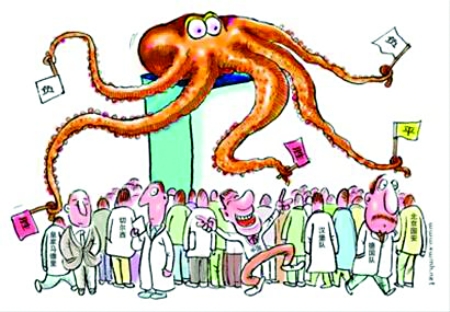Finding fame on China's Internet?
The generation without siblings born under China's one-child policy has finally found an outlet for their unrequited fraternal affections.
Even Paul the psychic octopus, who shot to fame predicting the World Cup results, could not have foreseen that he would live in China's Internet as "Brother Octopus."
 |
|
Paul, "Brother Octopus" |
Paul is one of a growing list of Internet stars uniformly dubbed "brother."
The title "brother", or "ge" in Chinese, has spontaneously erupted to describe any celebrated or notorious newsmaker, usually male.
"Brother" -- along with a "sister" moniker for noteworthy females -- shows how the Internet is shaping the language as ordinary people give vent to their emotions or frustrations through its sympathetic or ironic use, say experts.
"The word 'brother' to some extent represents Chinese social culture," says Xia Xueluan, professor of sociology at Peking University. "Many people tend to seek entertainment and find easy ways to express their feelings."
Although "Brother Octopus" was purely amusing, he adds.
The list of brothers includes "Brother Cameraman" who posted photos of government cars being used for private business in Shandong Province. His pictures of official vehicles outside schools, shopping malls and hospitals have struck a chord with people concerned that many officials take advantage of government cars for personal convenience.
"Netizens called him 'brother' in a respectful way and shared their concern for the public interest. The man set a good example in promoting cleaner government," says Yu Hai, another professor of sociology at Shanghai's Fudan University.
Meanwhile, a homeless man hanging around in the eastern port city Ningbo who gained overnight popularity for his dirty but "vogue" outfits has been dubbed "Brother Sharp" with a blend of mockery and sympathy.
The spate of pictures of the man was widely reported, prompting critics to urge people to let the man preserve his dignity.
"Every side of human nature, especially the dark sides, can be revealed in the virtual world. Any odd people, freaks or narcissists may get attention on the Internet while onlookers also get a sense of satisfaction through prying into other people's lives," Prof. Yu says.
China's leading "sister" is Luo Yufeng, a former supermarket cashier from Chongqing, known as "Sister Feng". She shot to fame after posting a provocative and narcissistic advertisement for marriage on the Internet last year.
Last month, Singaporean newspaper Lianhe Zaobao expressed some concern in a story about overnight vulgar stars like "Sister Feng", urging that the younger generation should avoid the trend of exposing ugliness to seek fame on the Internet.
Acknowledging the examples of questionable judgment, Prof. Yu says, "The 'brother' phenomenon reflects the real thoughts of grassroots people. Just like we called each other 'comrade' in wartime, now we prefer to say 'brother'."
Many young people also refer to themselves with a third-person "brother" or "sister" tag on-line and in daily conversation. Hu Yangfan, a graduate student from Beijing Forestry University, often calls himself "brother" in front of close friends.
"It sounds very amusing and trendy, and most importantly, and it helps me lighten up during the daily grind," Hu says.
Popular phrases related to "brother" was even brought into a Japanese textbook as a part of the introduction to China's current language trend, earlier media reports said.
"The Internet offers a platform for ordinary people to release feelings, while playing with words makes communication more interesting," says Prof. Yu.
 0
0 






